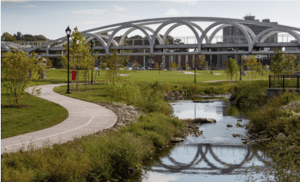 UConn Extension and the National Park Service are pleased to announce the publication of the Impacts of Trails info-sheet series. As communities throughout the U.S. and the world cope with the devastating toll of COVID-19, the pandemic has brought a renewed focus on the importance of local trails.
UConn Extension and the National Park Service are pleased to announce the publication of the Impacts of Trails info-sheet series. As communities throughout the U.S. and the world cope with the devastating toll of COVID-19, the pandemic has brought a renewed focus on the importance of local trails.
These one-page color, downloadable resources provide evidence–based information on the impacts of trails on physical and mental health, building community, stimulating economies, and fostering climate resilience. Each includes key data points from existing literature, a case study and a short list of recommendations. Communities highlighted include Meriden, Connecticut, New Haven, Connecticut, Canton, Connecticut, and Great Barrington, Massachusetts.
The health info-sheet includes six major benefits that trails have on promoting health. It recommends that communities animate trails with programs, increase public awareness about trails, and engage people not currently using trails. A case study on the Walk and Talk with a Doc initiative between Get Healthy CT and Yale Medicine in New Haven documents how trails have improved health outcomes for residents.
Trails drive economic development in communities through their positive impact on property values, expenditures at local businesses, and quality of life, among other attributes. The authors recommend that communities take a systems approach, connect their trails with downtown amenities, and engage and involve anchor institutions and local property owners in trail development. The Farmington Canal Trail in Canton provides further evidence of how the trail increased economic activity in the town.
 “Our vision was a trail network that offered something for everyone in the community, from easy walks around Lake Mansfield to a rigorous hike along our piece of the Appalachian Trail,” says Christine Ward, Director of the Great Barrington Trails and Greenways in Massachusetts. Trails in any community are catalysts for increasing environmental awareness, creating connections, and strengthening community resilience. Steps to build community with trails include programming, analyzing trail use, and thinking community wide.
“Our vision was a trail network that offered something for everyone in the community, from easy walks around Lake Mansfield to a rigorous hike along our piece of the Appalachian Trail,” says Christine Ward, Director of the Great Barrington Trails and Greenways in Massachusetts. Trails in any community are catalysts for increasing environmental awareness, creating connections, and strengthening community resilience. Steps to build community with trails include programming, analyzing trail use, and thinking community wide.
Climate change will bring many public health and safety threats to our communities and trails enhance resiliency through mitigation and by providing habitats for plants and wildlife. Trails also help decrease the carbon footprint of residents as more use the trails for travel. Communities enhance resiliency on their trails by making them feel safe and protected, encouraging residents to replace short vehicle trips, and connecting to transportation networks. A case study of Meriden shows how the trails and open space saved the downtown from flooding.
View all the impact sheets with the full benefits of trails and recommendations for community leaders at https://cttrailcensus.uconn.edu/trail-impact-series/.
UConn CAHNR Extension has more than 100 years’ experience strengthening communities in Connecticut and beyond. Extension programs address the full range of issues set forth in CAHNR’s strategic initiatives:
- Ensuring a vibrant and sustainable agricultural industry and food supply
- Enhancing health and well-being locally, nationally, and globally
- Designing sustainable landscapes across urban-rural interfaces
- Advancing adaptation and resilience in a changing climate.
Programs delivered by Extension reach individuals, communities, and businesses in each of Connecticut’s 169 municipalities.